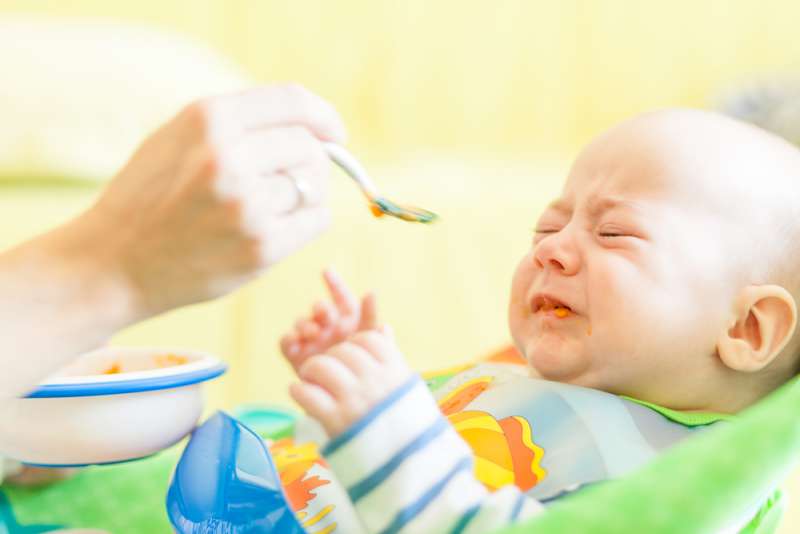Sore Throat in Babies: Symptoms, Causes and Treatment

As a parent to a newborn, infant or toddler, you have to go through quite a few challenges in life to make sure your little one is being brought up healthy and safe.
It is often said that “when your baby falls sick is when your real test of being-a-parent begins!”
Dealing with sore throat in babies has often been categorized by parents as one of the most challenging of all baby sicknesses.
Pharyngitis or sore throat is a condition that is caused by a viral or a bacterial infection of the throat.
This infection of the throat in babies causes inflammation on the inside of the baby’s throat and in turn makes swallowing difficult for the baby.
Sore throat in babies also causes itchy throat, irritation and discomfort in general for the baby.
This not just leads to fever and excessive crying in the babies but also makes feeding the little one very difficult.
Common Symptoms of Sore Throat in Babies
In order to help your baby deal with sore throat, you must be aware of a few common signs and symptoms of sore throat in babies.
Below mentioned are a few of the signs and symptoms of sore throat in babies:
VIDEO: 8 Common Symptoms of Sore Throat in Babies
#1 Baby crying excessively, especially while being fed
One of the most common signs that your baby has a sore throat is excessive crying while your baby is being fed.
As mentioned before, since sore throat causes inflammation of your baby’s throat, it makes swallowing food difficult for the baby. The baby feels irritation and pain not just while swallowing food but even while swallowing saliva.
This is very serious since proper and timely nourishment and food intake for a baby is really important in the growing days.
Sore throat, in addition to the pains and irritation makes food intake really difficult for the baby. And a combination of throat irritation, pain and hunger leads the baby to cry frequently.

#2 Redness of the baby’s throat
Redness of your baby’s throat is another common symptom of sore throat in babies.
However, noticing this symptom can be a bit difficult with newborns since it requires the baby’s mouth being wide open and have a view of the baby’s throat from the mouth. With infants and toddlers, it can be comparatively easier for the parents to notice this.
However, trying to open your baby’s mouth to have a view of the throat can cause discomfort in some babies and can leads to your baby crying further or vomiting in extreme cases.
Further, care has to be taken that your hands are properly washed and wiped before you touch our baby’s mouth.
It is therefore recommended, that you let your healthcare professional observe this rather than trying to do it yourself.

#3 Baby is irritable and restless
It is generally observed that sore throat in babies causes the baby to be very restless and generally irritable.
However, a baby being irritable and restless doesn’t necessarily indicate sore throat in babies.
There could be other possible reasons for it too such as the baby wanting to sleep, baby being hungry or feeling sick for reasons other than sore throat.
Regardless, irritability and restlessness in babies is also one of the symptoms of sore throat in babies.
#4 Swollen glands
Most of the times, when a baby has sore throat, the throat glands of the baby become swollen.
Just by looking at your baby’s neck or by touching and feeling you baby neck, you can feel the throat glands of your baby been swollen.
The more swollen the throat gland, the more severely your baby is affected by the sore throat infection.
#5 Bad breath
This is not always true but in some cases sore throat in babies can cause bad smelling breath of the baby.
The medical explanation to this is a combination of accumulation of mucus in the throat and the improper diet routine of the baby (which affects the stomach and indirectly causes bad smelling breath).
#6 Fever
Fever is the worst of all symptoms of sore throat in babies. In the majority of cases, even in adults, sore throat always leads to fever.
Fever, especially in newborns, infants and toddlers should always be managed with utmost importance and care.
If measures are not taken to deal with fever in babies, it only tends to continue to rise the baby’s body temperature and can cause harm in several different ways to the baby.

#7 Vomiting and Diarrhoea
This is one symptom of sore throat which is more common in babies than in adults.
Due to the weak immune system of babies compared to adults, sore throat in babies often causes vomiting and diarrhoea.
The main cause of vomiting and diarrhoea is “the baby feeling sick in general because of sore throat” and “irregular intakes of food and water” by the baby during the sore throat infection.
#8 Cough
Regular cough is another sign and symptom of sore throat in babies.
Cough can either be dry cough or mucus cough depending upon the condition of the baby and the cause of the infection.

Common Causes of Sore Throat
There are a variety of reasons that can cause sore throat in babies. It mostly start with the little one catching a catching a cold, followed by either a congested chest or a running nose. This is, in most cases, followed by headaches and muscle pain in babies.
VIDEO: 5 Common Causes of Sore Throat in Babies
#1 Flu
One of the most common causes of sore throat in babies is flu. If your baby has flu, in most cases the flu tends to cause sore throat in babies. Runny nose or stuff nose can be a sign that your baby has flu. If the sore throat has been caused by flu, the common symptoms will include:
- Dry cough
- Loss of baby appetite
- Vomiting and Diarrhea
#2 Viral Infection
A more serious cause of sore throat in babies is contagious or non-contagious viral diseases.
These viral diseases can be spread via the hand, foot or mouth of the baby:
- If the sore throat has been caused by a viral infection, common observable symptoms include:
- Red blister and red spots around the baby’s mouth.
- Rashes on the baby’s hands and feet.
- Red spots or rashes on the baby’s hips and other private parts.
- Irritation
- Baby not eating well
#3 Herpangina
Another common cause of sore throat is a contagious viral disease called Herpangina.
In cases when sore throat has been caused by Herpangina, following are the common symptoms:
- Gray and white spots appearing in and around the baby’s mouth.
- High fever
- Diarrhea
- Loss of appetite
#4 Strep Throat
Bacterial infection called strep-throat is another cause of sore throat in babies.
The following are a few common observable symptoms if the cause of the sore throat is a bacterial infection, the most prominent symptoms include inflammation and tonsils in the baby’s throat which is very painful for the baby.
#5 Dust allergies
Babies, especially newborns and infants are normally very sensitive and care should be taken to protect that from all sorts of allergy causing stuff such as dust, powders, spices etc.
Allergy causing stuff especially dust is also a common cause of sore throat in babies.
Treatment of Sore Throat
- Antibiotics: Usually doctors do not prescribe any antibiotics for babies under the age of 2 years. However, depending upon situation and the baby’s condition, doctors may recommend some antibiotics for your little one. However, this is only applicable if the cause of the sore throat is bacterial and not viral.
- Keeping protected from allergic stuff: Make sure you keep your baby protected from everything your baby is allergic to
- Keeping hydrated: Since swallowing food is difficult for the baby with sore throat, make sure to regularly feed your baby small sips of warm liquids, preferably warm water
- Avoid feeding Cold Liquids or Food: Avoid feeding cold fluids or cold food (such as yogurt) to the baby especially if the cause of the sore throat is cold and flu.
- Pain Reliever Medicine: Depending on the cause and the condition of your baby, the doctor may prescribe some pain reliever medicine, if he/she thinks it’s best for the baby.
- Feed Honey: You can also try feeding honey to your little one if they are older than 12 months.
- Feed warm soup: Feed your baby some warm soup. Make sure the soup has more liquid content than solid. Also make sure that the soup is not too hot.
- Allow your baby to rest: Restlessness and constant crying will lead to exhaustion of your baby. Let your baby rest as much as possible to give rest to the baby’s voice, throat and body.
- Steam to provide relief: You can also try steaming. Use a steamer with steamer liquid to help your baby relieve the pain. Steaming will also help sooth your baby’s throat as well as open your baby’s congested nose.
- Keep away from contagious environment: Avoid taking your baby into any crowded environment where they can easily catch the infection or other allergies. Further, try to keep your baby’s surrounding clean and dust free.
Helpful Tips(s)
Although seeking medical help for the baby is highly advisable at the very first signs observed such as fever, cough or non-stop crying etc., however, medical help is absolutely required for your baby immediately if:
- Your baby has high fever especially if it’s a newborn, infant or toddler,
- The your little one is having difficulty while breathing,
- Your baby is not in-taking food at all,
- If you don’t observe an improvement in your baby’s health and it keeps getting worst or stays constant,
- If you can see the signs of rheumatic fever such as rash or swelling after strep infection,
- If your baby seems very exhausted.
There are times when parents and guardians think that their little one doesn’t require medical help and they’d be able to handle the baby safely by themselves.
However, since newborns and infants are extremely sensitive, the deterioration of health can sometimes more drastic than they’d have expected.
High fevers and extreme sickness, if not taken care of in time, is seen to be fatal for babies in some cases.
Therefore, always seek medical help for your baby’s health situation if you think you’re unable to handle it.


